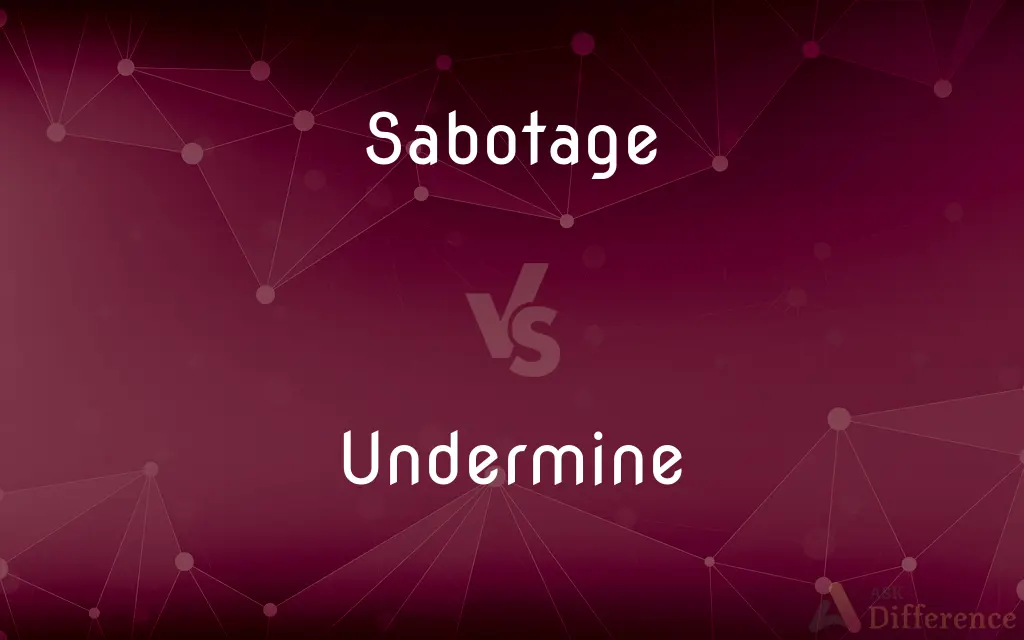Sabotage vs. Undermine — What's the Difference?
Edited by Tayyaba Rehman — By Fiza Rafique — Updated on April 25, 2024
Sabotage involves deliberate actions to destroy or hinder, often visibly and aggressively, whereas undermining is usually subtle and secretive, eroding support or confidence gradually.

Difference Between Sabotage and Undermine
Table of Contents
ADVERTISEMENT
Key Differences
Sabotage is typically a direct and intentional act to damage or disrupt, often involving physical actions against objects or systems. On the other hand, undermining tends to be an indirect approach, focusing on weakening ideas, relationships, or processes through subtler means like manipulation or misinformation.
In sabotage, the goal is usually to cause immediate and observable harm or dysfunction, often in a tangible form. Whereas undermining works gradually, aiming to slowly erode the foundation or credibility of a target, making its effects less immediately noticeable but potentially just as harmful over time.
Acts of sabotage are commonly associated with scenarios like wartime or industrial conflicts, where physical destruction or disruption can have strategic benefits. In contrast, undermining is often found in political, social, and workplace contexts, where the gradual weakening of trust or authority can shift power dynamics.
Legal and social consequences of sabotage are typically severe, reflecting its overt nature and potential for significant damage. On the other hand, the subtlety of undermining can make it difficult to detect and prosecute, often blurring the lines of legality and ethical conduct.
While both tactics can be employed for similar ends, such as destabilizing an opponent or organization, sabotage is clear and decisive in its methods and objectives, making it a blunt tool. Undermining, however, requires patience and cunning, making it a more insidious strategy.
ADVERTISEMENT
Comparison Chart
Definition
Intentional act to destroy or disrupt operations.
Subtle actions intended to weaken confidence or support.
Methodology
Direct and visible actions.
Indirect and often secretive techniques.
Typical Contexts
Wartime, industrial conflict.
Political, social, workplace environments.
Impact
Immediate and observable.
Gradual and less immediately noticeable.
Legal Consequences
Generally severe, due to overt nature.
Often ambiguous due to subtlety and indirectness.
Compare with Definitions
Sabotage
Interfering with political processes or events.
There were fears of sabotage during the election, with voting machines tampered.
Undermine
Manipulating situations to lessen support or enthusiasm.
The opposition's strategy was to undermine public trust in the government.
Sabotage
Deliberately destroying property to hinder an enemy's advantage.
The soldiers planned to sabotage the bridge to prevent the enemy's advance.
Undermine
Eroding the base or foundation of a structure or concept.
Continuous criticism served to undermine her confidence.
Sabotage
Intentionally causing defects in a product during manufacturing.
The inspector found evidence of sabotage in the assembly line.
Undermine
Subtly working against an idea or project.
They sought to undermine the proposal by questioning its feasibility in meetings.
Sabotage
Disrupting operations or systems to cause failure.
The disgruntled employee attempted to sabotage the computer network.
Undermine
Weakening someone's authority or position subtly.
He tried to undermine the manager by spreading rumors.
Sabotage
Engaging in actions aimed at undermining someone's efforts.
They sabotaged the project by withholding essential information.
Undermine
Gradually reducing effectiveness or strength.
His health issues began to undermine his ability to work.
Sabotage
Sabotage is a deliberate action aimed at weakening a polity, effort, or organization through subversion, obstruction, disruption, or destruction. One who engages in sabotage is a saboteur.
Undermine
To weaken by wearing away a base or foundation
Water has undermined the stone foundations.
Sabotage
The deliberate destruction of property or obstruction of normal operations, as by civilians or enemy agents in a time of war.
Undermine
To weaken, injure, or impair, often by degrees or imperceptibly; sap
Late hours can undermine one's health.
Sabotage
The deliberate attempt to damage, destroy, or hinder a cause or activity.
Undermine
To dig a mine or tunnel beneath.
Sabotage
To damage, destroy, or hinder (something) by sabotage.
Undermine
To dig underneath (something), to make a passage for destructive or military purposes; to sap.
Sabotage
A deliberate action aimed at weakening someone (or something, a nation, etc) or preventing them from being successful, through subversion, obstruction, disruption, and/or destruction.
Undermine
(figuratively) To weaken or work against; to hinder, sabotage.
The war efforts were undermined by the constant bickering between the allies.
Sabotage
To deliberately destroy or damage something in order to prevent it from being successful.
The railway line had been sabotaged by enemy commandos.
Our plans were sabotaged.
Undermine
To erode the base or foundation of something, e.g. by the action of water.
Sabotage
Scamped work.
Undermine
To excavate the earth beneath, or the part of, especially for the purpose of causing to fall or be overthrown; to form a mine under; to sap; as, to undermine a wall.
A vast rock undermined from one end to the other, and a highway running through it.
Sabotage
Any surreptitious destruction of property or obstruction of activity by persons not known to be hostile; - in war, such actions carried out behind enemy lines by agents or local sympathisers of the hostile power.
Undermine
Fig.: To remove the foundation or support of by clandestine means; to ruin in an underhand way; as, to undermine reputation; to undermine the constitution of the state.
He should be warned who are like to undermine him.
Sabotage
A deliberate act of destruction or disruption in which equipment is damaged
Undermine
Destroy property or hinder normal operations;
The Resistance sabotaged railroad operations during the war
Sabotage
Destroy property or hinder normal operations;
The Resistance sabotaged railroad operations during the war
Undermine
Hollow out as if making a cave or opening;
The river was caving the banks
Common Curiosities
How does undermining affect workplace relationships?
Undermining can severely affect workplace relationships by creating distrust and weakening teamwork over time.
Can sabotage be legal?
Sabotage is typically illegal, especially when it involves damage to property or disruption of services.
What are common signs of undermining behavior?
Common signs include subtle criticisms, spreading rumors, and quietly opposing ideas to erode confidence.
What is the main goal of sabotage?
The main goal of sabotage is to directly damage or disrupt operations to hinder effectiveness immediately.
Is undermining always intentional?
Yes, undermining is generally a deliberate act, though it might be executed subtly.
How can someone prove they were undermined?
Proving undermining can be difficult due to its subtle nature, but gathering testimonials or documented instances of behavior may help.
What are the psychological impacts of undermining?
The psychological impacts can include decreased self-esteem, increased stress, and a feeling of insecurity.
What is the difference in visibility between sabotage and undermining?
Sabotage is overt and easily identifiable, while undermining is covert and often goes unnoticed initially.
Can undermining be as damaging as sabotage?
Yes, in the long term, undermining can be as damaging as sabotage, especially in terms of relationships and morale.
Are there ethical ways to handle sabotage?
Handling sabotage ethically involves legal and disciplinary measures against the perpetrators.
What motivates someone to commit sabotage?
Motivations can include revenge, protest, or strategic advantage in conflict situations.
Can sabotage and undermining overlap in their methods?
Yes, there are instances where actions may both sabotage and undermine, particularly in complex social or organizational dynamics.
How can organizations protect against sabotage?
Organizations can implement strict security measures and monitor for any unusual activities.
How does one deal with being undermined at work?
Addressing the issue directly with the parties involved or seeking mediation might help resolve underlying conflicts.
What are the consequences of not addressing undermining behaviors?
Not addressing undermining can lead to a toxic environment and long-term organizational issues.
Share Your Discovery

Previous Comparison
Model vs. Mockup
Next Comparison
Judaism vs. ZoroastrianismAuthor Spotlight
Written by
Fiza RafiqueFiza Rafique is a skilled content writer at AskDifference.com, where she meticulously refines and enhances written pieces. Drawing from her vast editorial expertise, Fiza ensures clarity, accuracy, and precision in every article. Passionate about language, she continually seeks to elevate the quality of content for readers worldwide.
Edited by
Tayyaba RehmanTayyaba Rehman is a distinguished writer, currently serving as a primary contributor to askdifference.com. As a researcher in semantics and etymology, Tayyaba's passion for the complexity of languages and their distinctions has found a perfect home on the platform. Tayyaba delves into the intricacies of language, distinguishing between commonly confused words and phrases, thereby providing clarity for readers worldwide.
















































